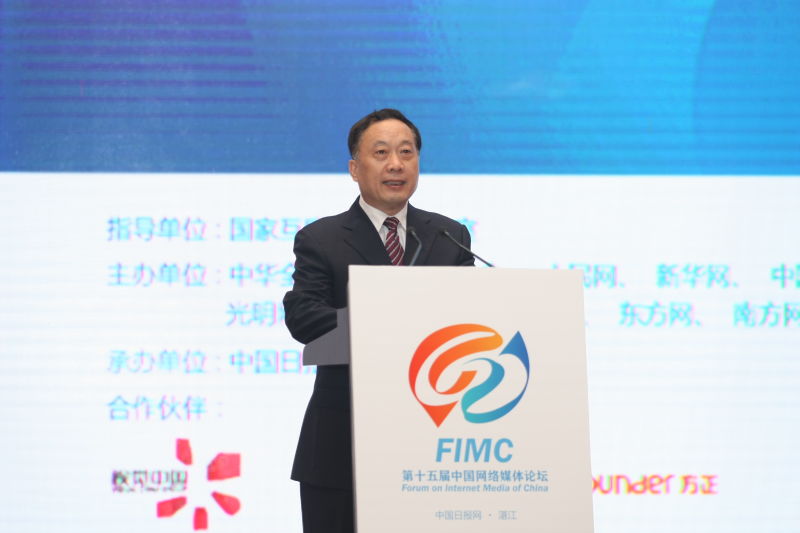
 |
|
Ren Xianliang, deputy chief of the Cyberspace Administration of China, addresses the opening ceremony of the ongoing 15th Forum on Internet Media of China that runs through Saturday. [Photo by Zou Zhongpin / chinadaily.com] |
China's Internet media should be at driver's seat to build a digital Silk Road that facilitates cross-border communication among countries and regions along the "One Belt, One Road", said Ren Xianliang, deputy chief of the Cyberspace Administration of China, on Friday.
Information connectivity plays a crucial part in developing cross-border information services and boosting cyberspace safety, which could start an online drive in this open and sharing digital era, said Ren in a keynote speech at the opening ceremony of the ongoing 15th Forum on Internet Media of China that runs through Saturday.
The forum, a three-day event that started in Guangdong's Zhanjiang city on Thursday, is set to launch an online Silk Road to turn a new page in Internet media cooperation on cross-border communication.
"Internet media should be a communicator and narrator of the Belt and Road Initiative, a facilitator in international cooperation, and an opinion leader in people-to-people exchange during the process," Ren added.
Themed "E-path to One Belt, One Road", the forum follows the Belt and Road Initiative and the "Cyberpower" strategy put forward by the CPC Central Committee led by general secretary Xi Jinping since 2013.
Zhu Ling, president and editor-in-chief of China Daily, and Wang Zhongbing, mayor of Zhanjiang, are both attending the event in the southern coastal city. The national media outlet and municipal government have co-organized this year's event.
More than 300 guests are at the event, including leaders of key Internet websites, at both national and regional levels, major players in investment institutions and the Internet sector, experts on the Belt and Road Initiative, industry representatives and city officials.
They will provide guidance or brainstorm on the roles media convergence and technological innovations can play in the context of the new situation and new normal, and how online media can better help boost the Belt and Road Initiative.
An accord, known as the Zhanjiang Consensus, will be reached at the end of the forum.
Zhanjiang was a starting point of one of ancient China's earliest maritime trading routes, during the Han Dynasty (206 BC – AD 220). It is now one of the 15 pivotal cities in the Belt and Road Initiative -- a reference to the Silk Road Economic Belt and the 21st Century Maritime Silk Road initiatives, transport infrastructure projects linking Asia and Europe, proposed by President Xi Jinping in 2013.
Also participating are Zhai Huisheng, Party secretary and managing vice-president of the All-China Journalists Association; Shen Haixiong, vice president of Xinhua News Agency; He Dongping, editor-in-chief of Guangming Daily; Wang Qiu, former head of China National Radio; Wang Gengnian, head of China Radio International; and Chen Yunxian, vice-governor of Guangdong province.
The forum, led by the Cyberspace Administration of China, is co-hosted by the All-China Journalists' Association and major news websites at both national and regional levels.
It is the second time that China Daily website has undertaken the job of co-organizer, having first been involved with the sixth event nine years ago.
Initiated in 2001, the forum has evolved into the most high-profile and influential annual event in its field. As a developed platform for exchange and cooperation among government, industry and academia, the forum has witnessed the development of the Chinese Internet industry. Topics raised at previous events have set the trends of the development of Chinese Internet media.